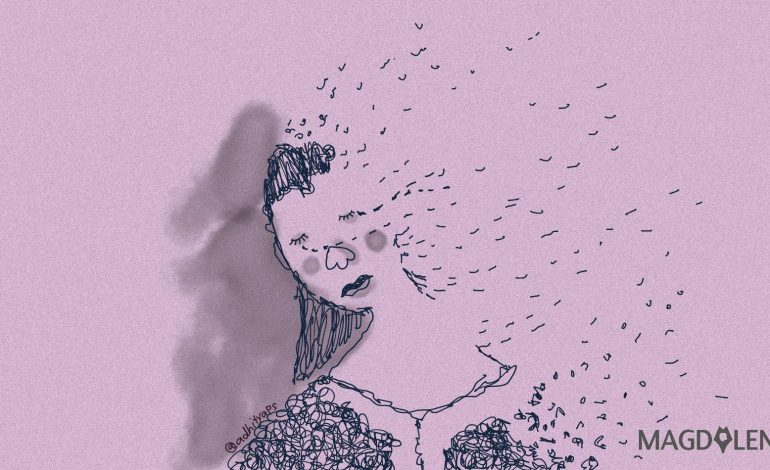The Long and Endless Struggle to Pass Anti-Sexual Violence Bill in Indonesia

Among many victims and survivors of sexual harassment and sexual abuse in Indonesia, Baiq Nuril is one of the bravest who took risks to report her abuser to the authority. Yet, her struggle to seek justice has not been straight forward. She has had to deal with strong resistance of patriarchal values and systems in the society.
Nuril was put in jail and fined for defamation under the Law No 11/2009 on Electronic Information and Transactions. She then submitted a petition to challenge the ruling conviction, which was rejected by the Court of West Nusa Tenggara. Baiq Nuril was found guilty of spreading the recording of her call with the harasser, who happened to be her superior at the workplace (and to make things worse, it’s a school!).
Last week, Baiq Nuril got the justice she deserves when she received amnesty from the President and House of Representative. Some see it as a hope that change will come in the fight against sexual harassment and abuse, but the amnesty does not necessarily prove that she is a victim of sexual harassment, because amnesty only has an individual implication.
There are so many elements of Nuril’s case that indicates the serious challenge Indonesia faces in addressing sexual harassment and sexual abuses in Indonesia, particularly at workplace and educational institutions, and the challenge is embedded in gender inequality,
President Joko Widodo has showed his interest in achieving SDGs through the establishment of Presidential Regulation (Perpres) No. 59/2017 on the implementation of the SDGs and SDGs’ task force. Long before that, there was the Presidential Instructions on Gender Mainstreaming (INPRES No. 9/2000) aimed at reducing the gap between Indonesian women and men in accessing and obtaining development benefits, as well as increasing participation in and control over the development process.
However, without real action in protecting women and children against sexual violence, SDG 5 on gender equality and 16 on ending violence and promote justice would only be a tale that is nice to share.
The struggle to free Indonesian women and children from fear of sexual violence have been a long journey. The Bill on the Elimination of Sexual Violence has been held back at House of Representative for five years, despite the tremendous public action, from marches, public discussions, media conferences, theatrical protests, to op-ed pieces in the media and evidence-informed recommendations. Civil society, youth groups, and some media organizations have been key in pushing the House to pass the bill.
Feminist-movement coalition recently published a staggering survey result: three out five women have been experiencing at least one form of sexual harassment in their life-time. A research published by SMERU-MAMPU showed that 16 percent of women have experienced at least one type of domestic violence or intimate-partner violence.
The National Commission on Violence against Women (Komnas Perempuan) has been involved through its roles in collecting evidence, aiding the survivors, conducting advocacy efforts and providing recommendations to the President on sexual violence problem. Yet, politicians seem too busy serving their own interests.
Looking back, Indonesia has unfinished business on sexual violence cases, and one of them is the Jugun Ianfu, women or girls who were forced into sexual slavery and brutally abused by the Japanese Imperial Army in 1942-1945. The tragedy of Jugun Ianfu cannot be separated from sexual violence history in Indonesia, where women’s bodies became the locus of oppression as a symbol of conquest. Since then there have been others: the sexual assaults of members of the women movement Gerwani in 1965, the rape of ethnic Chinese women in 1998, and the assassination of Ita Martadinata, one of the 1998 rape victim who was killed before she was due to give a testimony at the United Nations.
After 21 years of Reformasi, Indonesia has not shown significant progress in the fulfillment of justice for women victims. Violence against women comprises a wide range of acts, from verbal harassment and other forms of emotional abuse to daily physical or sexual abuse. At the far end of the spectrum is femicide, the murder of a woman. Data from the National Commission on Violence Against Women show that the patterns, types, and forms of sexual violence have evolved, including in the cyber world. Meanwhile the existing law that deals with sexual violence, the Indonesian Criminal Code, remains stuck in the past, consisting rigid definition of what constitutes sexual violence.
There is an urgency for a specific and comprehensive legal form to protect victims’ rights, as the Indonesian Criminal Code still fails to protect women and girls from sexual violence and to give victims’ rights. The Code itself is also unable to answer the evolving forms of sexual violence, and it is devoid of victim’s perspective.
In addition, Indonesia’s law culture gives no place for the voices of women victims of sexual violence that manifests in the difficulty to meet the requirement for verification, and gender- biased questions that victims have to answer in court. The Supreme Court has issued the Regulation No. 3/2017 on the Guidelines on Prosecuting Legal Cases Involving Women to encourage judges to adopt the perspective of the women victims in trying their cases, but implementation has not been effective, as reflected in the Baiq Nuril case.
The existing laws and regulations do not regulate the protection of all victims of sexual violence because they do not regulate the types of sexual violence (including elements of criminal acts and protected subjects) and the rights of victims to comprehensive handling, protection and restoration. Proposed by the women’s movement since 2015, the Bill on the Elimination of Sexual Violence is the hope for women victims and the community. The bill does not only emphasize retributive justice (punishment), but also focus on restorative justice, which is also one of the elements in the Indonesian Criminal Code Amendment Bill.
The restorative justice approach aims to restore victims, perpetrators and the community. Furthermore, the Bill on the Elimination of Sexual Violence aims to prevent all forms of sexual violence; to deal with, protect and restore victims; to take action against perpetrators; and to realize an environment free of sexual violence. The bill includes nine types of sexual violence namely: sexual harassment, sexual exploitation, forced contraception, forced abortion, rape, forced marriage, forced prostitution, sexual slavery, sexual torture.
But the Bill has been contested by conservative groups and those who reject the feminism discourse and movement in Indonesia. These groups claim the bill promotes premarital sex and homosexuality. The truth is the bill covers violence against everyone, men, women, girls, boy, children, elderly and minority groups. Importantly, the bill includes the restoration of victims of sexual violence through providing health services and legal assistance.
The deliberation of the Bill in the Commission VIII, which deals with religion and social affairs, in the House of Representatives has been slow since it was put forward in the House in February 2017. In a meeting of the Draft Bill last month, the working committee targeted to ratify the bill by September this year.
Currently Komnas Perempuan, Gerakan Masyarakat untuk Pengesahan RUU Penghapusan Kekerasan Seksual (Community Movement for the Bill on the Elimination of Sexual Violence), Jaringan Kerja Prolegnas Pro Perempuan/JKP3 (the Network for Pro-Women National Legislation Program) and other partners lobbied the House of Representatives team to push for the bill’s ratification. They point at Baiq Nuril’s case as a proof that Indonesia urgently needs to stop the prevalence of sexual violence and there is a need for comprehensive legal protection for victims.
Now, the clock is ticking. We only have two months left before new Parliamentary members are sworn in. The stake is too high if the bill doesn’t get passed. Our fight for justice for the millions of victims who have suffered will have to start from square one again.






















